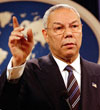News
Colin Powell now says gays should be able to serve openly in military
by Karen DeYoung - The Washington Post
Thursday, February 04, 2010

Retired Army Gen. Colin L. Powell, whose opposition to allowing gay men and lesbians to serve openly in the military helped lead to adoption of the "don't ask, don't tell" legislation 17 years ago, said Wednesday that he now thinks the restrictive law should be repealed.
"Attitudes and circumstances have changed," Powell said. "It's been a whole generation" since the legislation was adopted, and there is increased "acceptance of gays and lesbians in society," he said. "Society is always reflected in the military. It's where we get our soldiers from."
At the same time, he said, "we've had a lot of experience watching what other nations have done." Of 28 NATO member countries, a small minority prohibit or restrict service based on sexual orientation.
Powell spoke in an interview the day after Adm. Mike Mullen, the chairman of the Joint Chiefs of Staff, told Congress that it is his "personal belief" that lifting the ban is "the right thing to do." Defense Secretary Robert M. Gates said the Pentagon is preparing to repeal the law, despite significant opposition in Congress.
"If the chiefs and commanders are comfortable with moving to change the policy," Powell said, "then I support it." Public opinion polls since 2005 have consistently shown significantly more than half of all Americans supporting a repeal.
Powell's opinion, announced in a statement he issued early Wednesday, gives military leaders important additional backing in their push for a nonrestrictive policy. President Obama has done little to advance a campaign pledge to implement such a policy. Powell, a Republican who served as secretary of state under President George W. Bush, threw his support to Obama's presidential campaign in October 2008.
A question about sexual orientation had long been standard on military recruitment forms, and acknowledgment of homosexuality led to automatic rejection. Bill Clinton pledged during his 1992 presidential campaign to abolish all such restrictions. But less than a week after his inauguration in 1993, in a meeting with service chiefs arranged by then-Chairman Powell, Clinton wilted under their opposition. Concerned that the controversy would undermine his larger policy goals and aware that a congressional majority opposed lifting all restrictions, Clinton ultimately backed a compromise that Powell called "stop asking and stop pursuing."
During congressional hearings that year, liberal Democrats called Powell, who is black, a hypocrite for not opposing discrimination based on sexual orientation -- which he called a "behavioral characteristic" that could undermine military order and discipline -- while denouncing discrimination based on what he called the "benign, non-behavioral characteristic" of skin color.
The 1993 legislation did not require gays to disclose their sexual orientation to the military but required their discharge if it became known to their commanders. "My problem with the compromise [was] that it became law," Powell said at an Aspen Institute conference two years ago. "I would just as soon have seen it remain a policy so that the military could deal with it."
Some this week objected to that view, as well as to Gates's statement Tuesday that he will appoint a special military commission to study the issue for up to a year. Clifford Alexander Jr., who served as Army secretary under President Jimmy Carter, said that Obama should insist that any study take no more than a month, and that the decision should be made by civilians, not the military.
"It's not appropriate . . . to wait for a group of people in uniform to say, 'Okay, now it's time,' " Alexander said. "Get it done."
Obama, like Clinton, received strong support from gay voters, a group that has expressed disappointment about his lack of action on his campaign pledge. In an interview last spring, national security adviser James L. Jones, a retired Marine general, said he had counseled Obama not to add the "don't ask, don't tell" controversy to his already full plate in 2009. The president, Jones said, took his advice.
